|
|
|
Sort Order |
|
|
|
Items / Page
|
|
|
|
|
|
|
| Srl | Item |
| 1 |
ID:
188233
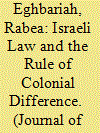

|
|
|
|
|
| Summary/Abstract |
Israeli law is an important medium that maintains, perfects, and facilitates the fragmentation of Palestinians. Israeli citizenship figures in this structure of fragmentation as an exceptionalizing legal status that blurs “colonial difference” between Palestinian citizens in Israel and Jewish Israelis. The May 2021 uprising and its aftermath not only highlighted the counter-fragmentary forces present among Palestinians across different legal statuses, it also brought into clearer view a rule of “colonial difference” that crisscrosses the Israeli legal system and pertains to all Palestinians under its control. This essay explores the concept of “colonial difference” as applied to Palestinians through the law, and how this rule has been employed in the context of the May 2021 uprising against Palestinian citizens in particular.
|
|
|
|
|
|
|
|
|
|
|
|
|
|
|
|
| 2 |
ID:
137738
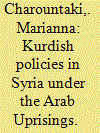

|
|
|
|
|
| Summary/Abstract |
The effect of the Arab Uprisings on the interplay of state and non-state entities is revealed as influencing the emergence of multiple players of non-state status pursuing democratic rights, and as attempting to dismiss regional despotism as an intrinsic element of ongoing transition in the Middle East. This article focuses on the positive overall effect on the Kurdish movement of unity and cooperation between KRG and PKK-PYD actors to achieve Kurdish harmony, and as interconnected paradigms vis-à-vis their influence and interaction with regional players. Given the rise of the Kurds in Syria and the KRG’s regional importance as the first actual Kurdish de facto state entity, the PKK’s role appears key for unifying and institutionalising the relatedness of the Kurdish movements in Iraq and Syria. An empirical understanding of the Kurdish case, explained through a conceptual model of ‘multi-dimensional interrelations’, may further clarify how the theoretical framework can be applied to International Relations
|
|
|
|
|
|
|
|
|
|
|
|
|
|
|
|
| 3 |
ID:
178775
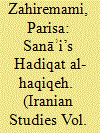

|
|
|
|
|
| Summary/Abstract |
This paper explores the unity of the Hadiqat al-haqiqeh, a medieval mystical didactic work composed by the twelfth-century Persian poet Sanāʾi. It provides one possible reading from the text by following the link between some of the major themes discussed in its chapters. By doing so, the paper first challenges the common view of the work as a fragmentary, non-narrative text, and second it draws attention to the synthesis of political ethics and Sufi didacticism as a possible starting point in the interpretation of the work. It also highlights the possibility—and necessity—of further scholarly inquiry into the Hadiqeh, regardless of issues caused by its complex textual history.
|
|
|
|
|
|
|
|
|
|
|
|
|
|
|
|
| 4 |
ID:
077877


|
|
|
|
|
| Publication |
2007.
|
| Summary/Abstract |
This article explores the different ideas of community circulating in the aftermath of the 7 July 2005 bombings in London. Specifically, it compares the idea of a community in unity with a more cosmopolitan, urban idea of community. While these two ideas seem to present sharply different responses, the article questions the extent to which the cosmopolitan model offers an alternative to the nationalist idea of community. Drawing on various discussions about how ideas of community are produced through different understandings of time and origins, the article argues that in this specific case both the national and the cosmopolitan accounts of community worked according to a very similar logic, and therefore risked reproducing similar problems and exclusions. Consequently, the article suggests that the task of exploring alternative conceptions of community must involve greater sensitivity to the politics of time and other approaches to the politics of origins. This challenge is pursued through the motif of the city as a site expressing a different temporality and thus a different idea of community from that expressed in traditions of national belonging.
|
|
|
|
|
|
|
|
|
|
|
|
|
|
|
|
| 5 |
ID:
151268
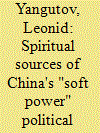

|
|
|
|
|
| Summary/Abstract |
The author analyzes the philosophical sources of the "soft power" strategy formation as one of the major components of the modern China political orientation. The PRC demonstrates notable achievements in the economic, political, social, and cultural spheres. The article also examines Daoism, Confucianism, and Buddhism, which exerted great influence on the formation of the "soft power" concept principles in China, and shows the use of these teachings for political influence on neighboring countries.
|
|
|
|
|
|
|
|
|
|
|
|
|
|
|
|
| 6 |
ID:
169192
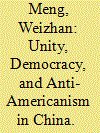

|
|
|
|
|
| Summary/Abstract |
Many American scholars and pundits have recently concluded that the United States’ 40-year engagement strategy has failed to guide China to embark on the path of liberal democracy. Therefore, some scholars suggest that the United States separate itself from China, possibly through a policy of economic “disengagement,” or perhaps return to the containment policy.1 Such policies, however, could backfire and would not be conducive to China’s interests or to those of the United States and the Western world. It is still entirely possible for the United States to facilitate China on a path toward further political diversification, economic liberalization, integration with the Western world, and compliance with international rules.
|
|
|
|
|
|
|
|
|
|
|
|
|
|
|
|
|
|
|
|
|